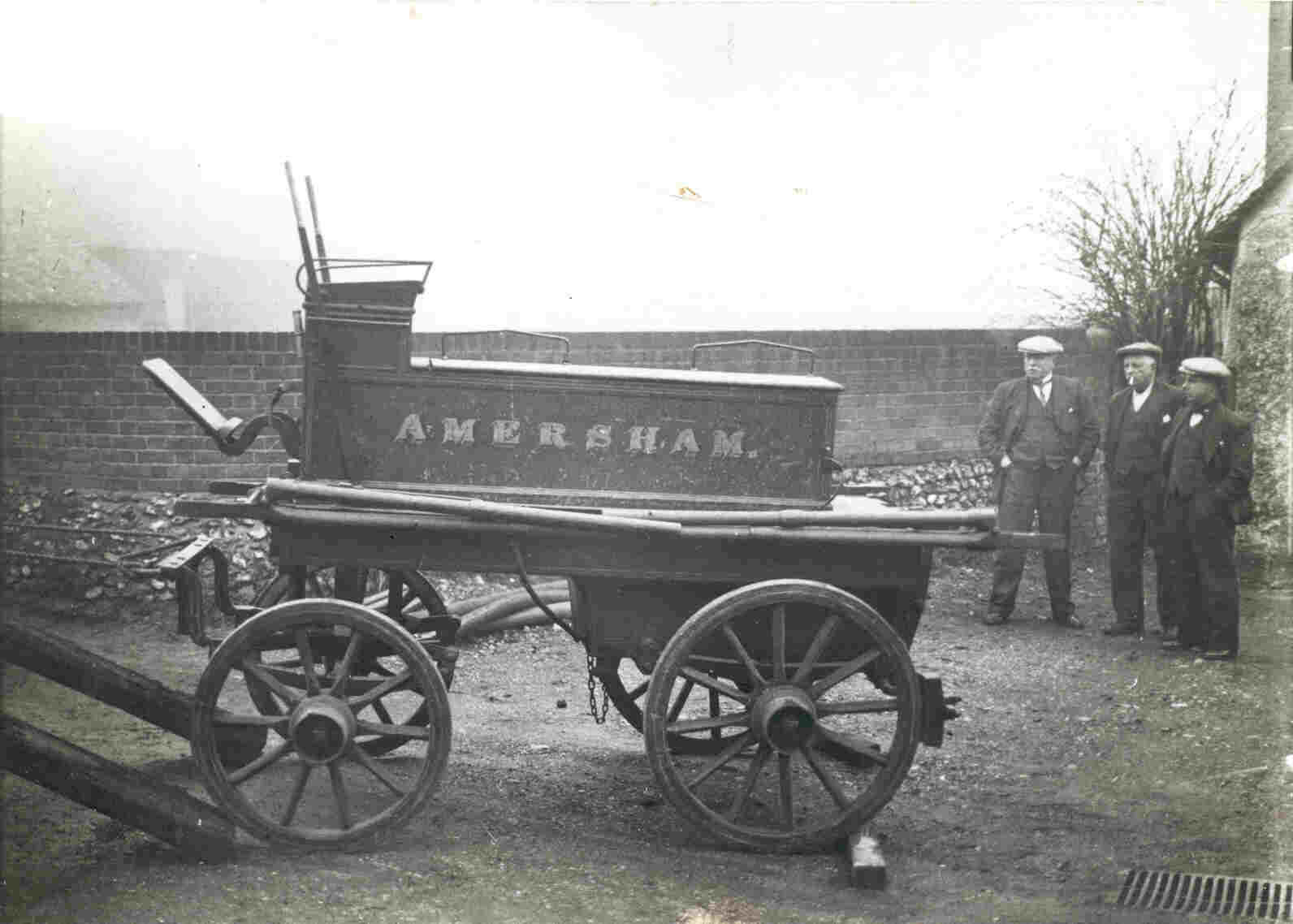Copied from the January and March 1983 and January 1984 Amersham Society newsletters and written by Horace Freeman with an introduction by Frank Peers, who was Secretary of the Amersham Society for many years
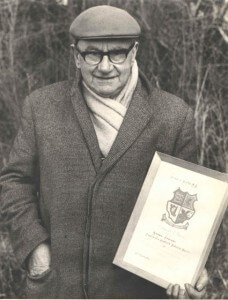
Almost exactly three years ago, in January 1980, Amersham lost one of its great characters and a much loved man, when Horace Freeman passed peacefully away in Amersham Hospital at the age of 91. He had lived in Amersham since he was 8 years old and had been a mainstay of Amersham Town Football Club for nearly 70 years, first as a player, then Secretary, groundsman and Vice-Chairman, eventually becoming a life member of the Club. He was a staunch supporter to the end, actually attending their match on the Saturday before he died.
But the greatest mark he made on the football scene was as a referee, a career he took up after giving up playing. This lasted for 25 years reaching the peak of refereeing the Berks & Bucks Cup Final between Wycombe Wanderers and Aylesbury and earning him many distinctions including a merit award from the Referees Association and the Vice-Presidency for Life of the Berks & Bucks FA.
He was never persuaded to make a tape recording of his experiences for the Society, but he gave us long written statements, of which the following is an extract.
Random Thoughts from Horace
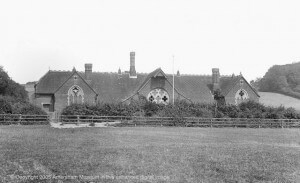
I moved from London with my parents and came to Amersham to live when I was a boy. This is what I have seen and what has happened since I was a lad. The first thing was a school to go to and I was sent to St Mary’s which is still standing in School Lane. The Headmaster was Mr Garton who lived in Market Square and my teacher was Mr W Andrews, son of Sergeant Andrews, Amersham’s only policeman, who lived in the Broadway. The Grammar School was then in Market Square and the Headmaster, a gentleman named Mr Wainwright, used to walk to school with his gown and mortarboard on.
The Amersham Union was in Whielden Street, part of the present hospital, and in the evening the tramps would make their way there to go in for the night. They would be kept in for the next day, breaking up stones which the Board of Guardians bought from the farmers, to make up the roads in the district. The tramps were let out at 10 o’clock the next morning and would knock at peoples’ doors to ask for hot water and a bit of tea – and something to eat if you were willing. They had to get to Aylesbury or Slough, their next port of call.
There were some inmates in the Union and small old peoples’ ward. My wife started in this ward as a wardsmaid and became a nurse and I married her from there. She was born in Amersham. One night a gentleman named Paul England* was ill and because they could not contact his friends and somebody had to sit up with him, I was asked to stand in for them and keep the night nurse company. I remember him singing a solo ‘Lord God of Abraham’ in St Mary’s church at a Church of England’s Men’s Service. (*Paul England was a prominent resident of Amersham, an operatic baritone who lived in Market Square. He wrote an excellent book of stories from operas and was the author of the poem ‘Bells of Amersham’ which was published during World War I in aid of the British Farmers’ Red Cross Fund and first recited by the author in the Market Hall on Thursday 21st September 1916.)
Mr Joe Williams who lived at Mill View, Chequers Hill, would take a concert party up to the Union every Christmas night for years to give the inmates a concert. I used to go up and sing one or two comic songs. But there’s no Union now, and no tramps, and one must be thankful.
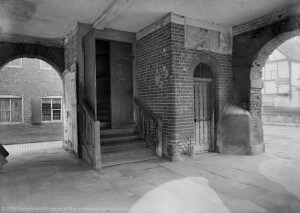
When a lad had left school in those days, there was nowhere to go, but we could go to night school two nights a week. Some nights we would take a large potato round to the Malthouse (The Maltings) and bake it and sit round the fire and have a chat with the men. Other nights, if we had a penny or two, we would go to Ann Southam who had a shop just by the Town Hall, buy a treacle tart and sit in her chimney corner and eat it.
Street lighting in Amersham was by gas and one man had to go round the town, up Station Road and down Rectory Hill, to light the lamps with a pole and put them out. After some years, the Council had clocks put on them and then he had to go round with a ladder once a week to wind the clocks up.
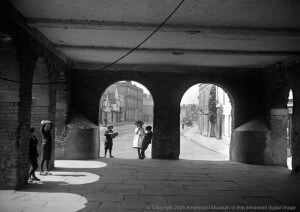
Fire Service – The fire bell (at the Market Hall) rings and Mr Wilkins, who was a coal merchant and carted goods for the railway, had to get the horses to the Fire Station as soon as possible. We, as lads, if we were about, would run to the fire so that we could do a little pumping of the old ‘Manual’. Of course, the town got more up-to-date and the Council decided to have a motor fire engine. However, we had to have a poll first so one of the councillors, known as Happy Arthur, got a big bell and went round the town shouting ‘Vote against the fire engine’. I may say I was one of the first to drive the motor because I served five years in the Brigade but had to leave because I was a Special Constable and could not serve in the two. I was sworn as a Special Constable in the General Strike and served 25 years and have the medal and two bars.
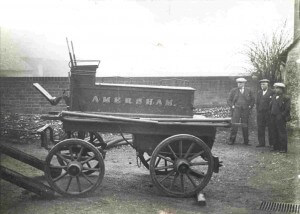
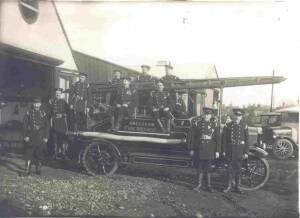
Market Day in Amersham was every Tuesday and the bell on the Town Hall was rung at midday, but I never saw any market. We always had a Fair and Cattle Market on Whit-Monday. The sheep and pigs would be in pens on the pavement in Whielden Street and cows in the Broadway. After 2 o’clock when the cattle had been driven away, the horse dealers would run their horses up and down the Broadway to try and sell them.
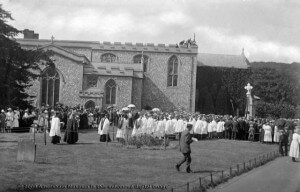
I think we in this town have a very fine old Church. I was confirmed and married there. I can just remember the last of the Drakes to be the Rector and the appointment of Rev. C E Briggs as Rector. There was no cross or candlesticks on the altar, only a black cloth on the Communion Table and the choir had no cassocks or surplices, but this is all altered. I can also remember all the bodies taken out of the little chapel and put on the long grass on the other side of the Church at 12 midnight. The Processional Cross was given to the Church by Mr T Selby, who lived in the Broadway, in memory of his wife and I carried this cross all around the cemetery when the Bishop of Oxford consecrated the ground.
The Church Rooms – I was with Rector Briggs one day, after Weller’s Brewery had been sold to Benskins, and we wanted somewhere to hold our Club and the Girls Club because we had to go up to the Rectory. So we met the Chairman of Benskins Brewery one day and we stated our case. He asked how much we were prepared to pay for it. We said ‘we have not any money’. I said it would be very nice if he would make us a present of it for somewhere to hold our Club. He said he must make a sale, so we gave him ten shillings and it was made over the Church. The girls, members of Miss Cornabé’s Girls Club, and the boys, members of the Bible Class, worked and cleaned the place up. We ran sixpenny hops every Wednesday night from 8 – 10pm and when we had got enough money we had the front filled in and a new dance floor laid. Club nights were held for the boys and Miss Cornabé’s Girls Club. I should like the willing helpers and the people who helped to run and clean the place to be mentioned: they were the late Mr and Mrs G Longland, Mrs B Wright and my dear wife. They all put a lot of time into this good work. One of the special nights of the year was the Parish Tea. We always had a grand tea and Dr & Mrs Wynne who lived in the Broadway House and Miss Cornabe’s two brothers would all come and sing to us. Of course, the Rooms were also used for other Church events.
I can remember all the gutters in the whole length of the town, Whielden Street and Church Street, being swept by one man before 10.30am every day. When the Alley** was standing, the row of houses in front had no toilets, only a large bucket. This same man would empty them after everyone had gone to bed. (** ‘The Alley’ – officially Church Alley – was next to the block of cottages which used to form the east side of Market Square. The buildings were demolished in a slum clearance scheme in 1939 and the Memorial Gardens were afterwards laid out on the site.)
![The team in about 1910 (PHO9664) [which is Horace?]](https://amershammuseum.org/wp-content/uploads/2013/02/9664.jpg)
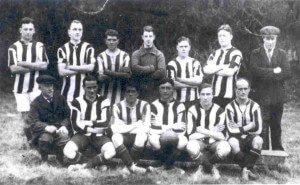
Football – now this is my life. If I can get someone to talk to me about the game I am very pleased. I started with St Mary’s Bible Class, I was secretary of the Club. We had to attend the Bible Class otherwise we were not allowed to play. The subscription was 2d per week. I was still a supporter of the Town Club: three of us ran all the way to Beaconsfield to see Amersham play – 10 miles. I can remember three players in this team – T Howland from Rushymede, Coleshill, G Gomm, Fred Gomm’s father, and Reggie Edward’s father. Reggie’s father was a solicitor’s clerk in Mr Rushforth’s office at Whyte Posts in the High Street.
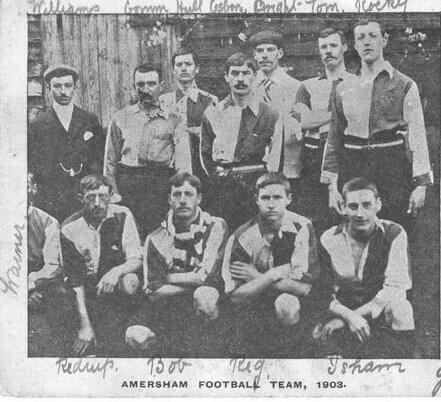
We ran the Bible Class Club for three seasons and then a challenge came from the Town Team to play them. We took £16 on the gate and played at the bottom of Rectory Field. Someone told the Rector he was running a team against the Town Team so the Rector told all the lads to go and join the Town Team. The following season the Amersham Town won three cups in seven days. I was appointed Assistant Secretary of the Town and have played and worked for the Club over 60 years. I am still doing what I can for them, I intend to put back the pleasure I got out of it.
I have been asked what kind of players we had in years gone by. Several of our players represented the County. We won the Berks & Bucks Junior Cup, the Hellenic League Premier Division and the League Cup. Some years ago I ran a boys under 18 team for four years and we could beat any team at that age around here. I am only sorry there is so little support for our team nowadays. I feel I have done my bit. I have been Secretary, Match Secretary, Vice-Chairman and Chairman, and now I am a life-long member.
Cricket – Amersham can say they have always had one of the very best teams for miles around. They used to play in Barn Meadow as soon as the football season had finished. The groundsman had to put up the tent every match and prepare the wicket. There were cattle grazing while you were playing and if you didn’t look where you were stepping you could very soon get your boots and white trousers mucked up. I was never a great cricketer but I did get 46 runs on High Wycombe ground once. I was in with a chap nicknamed Sloper Joe who worked at the brewery. But everyone must be very pleased with the lovely ground in Shardeloes Park. I love to go there; it is so nice and the club members come and have a chat with me.
Boxing – Amersham Town at one time had one of the finest boxing clubs for miles when the old brewery was not occupied. The ’Gentleman’ of the club was Dr Gardener of The Firs in the High Street. He got support from all the other gentlemen of the town to form the club. They secured a full-sized boxing ring and the lads rallied round. The Secretary was Sergeant Black, a police sergeant stationed in Amersham. One or two members are still around: Mr Claude Taylor of Post Office Yard was one of the men who boxed. The club had matches with Luton and Aylesbury and some well known amateur boxers came. I have seen boxing at the Club Champions of Oxford, of the London Fire Brigade and of the RAF. For a little money this was a great night, the front seats occupied by the doctors, tradesmen and gentlemen all in dress suits and a wonderful display of silver cups, etc. to box for. Can you forget? No!

